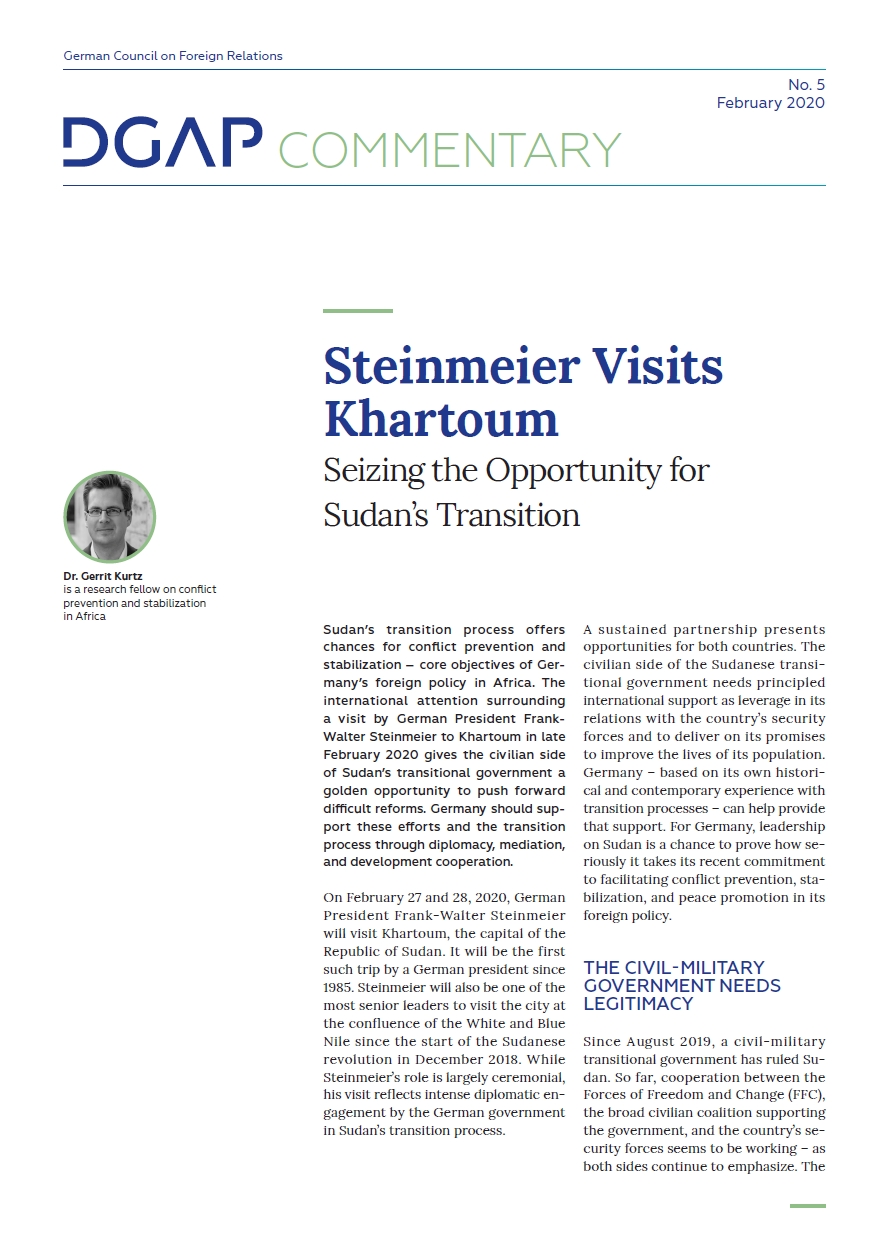On February 27 and 28, 2020, German President Frank-Walter Steinmeier will visit Khartoum, the capital of the Republic of Sudan. It will be the first such trip by a German president since 1985. Steinmeier will also be one of the most senior leaders to visit the city at the confluence of the White and Blue Nile since the start of the Sudanese revolution in December 2018. While Steinmeier’s role is largely ceremonial, his visit reflects intense diplomatic engagement by the German government in Sudan’s transition process.
A sustained partnership presents opportunities for both countries. The civilian side of the Sudanese transitional government needs principled international support as leverage in its relations with the country’s security forces and to deliver on its promises to improve the lives of its population. Germany – based on its own historical and contemporary experience with transition processes – can help provide that support. For Germany, leadership on Sudan is a chance to prove how seriously it takes its recent commitment to facilitating conflict prevention, stabilization, and peace promotion in its foreign policy.
The Civil-Military Government Needs Legitimacy
Since August 2019, a civil-military transitional government has ruled Sudan. So far, cooperation between the Forces of Freedom and Change (FFC), the broad civilian coalition supporting the government, and the country’s security forces seems to be working – as both sides continue to emphasize. The partnership works because both sides need each other. On the one hand, the security forces – which include not only the Sudanese Armed Forces, but also the Rapid Support Forces (RSF) headed by General Mohammed Hamdan Daglo, also known as Hemeti – control large swathes of the economy, possess excellent relations with important Arab countries, and play a leading role in the negotiations with armed groups. On the other hand, though, they lack exactly what Sudanese Prime Minister Abdalla Hamdok, his cabinet, and the FFC bring to the table. The government needs the support of the unions, professional associations, political parties, and social movements that make up the civilian revolutionary coalition for domestic legitimacy. Since many Western governments shun Hemiti and the RSF, the same holds true internationally. Indeed, opposition parties in Germany’s legislature, the Bundestag, have called on the federal government to ensure that renewed development cooperation would not entail the training of Sudanese security forces.
Sudan’s transformation will require continued pressure from the streets and international diplomacy
The cooperation between the FFC and security forces is not, however, as stable as it seems. Events in recent weeks show that threats to the partnership can emerge at anytime. On February 19, 2020, people took to the streets to protest the dismissal of junior military officers who had joined the revolution early on. The police in Khartoum, whose chief was appointed by the government of former President Omar al-Bashir, cracked down on the demonstration with tear gas and batons, injuring 53 people in the process. In reaction, Prime Minister Hamdok created a commission of inquiry headed by the attorney general.
Such incidents risk derailing the foundation of civil-military cooperation in the transitional government. People in Khartoum are eagerly awaiting the results of another commission of inquiry set up to investigate the violent crackdown on a sit-in held on June 3, 2019, in which more than 120 people were killed and more than 900 injured. While the RSF is widely believed to have been responsible for this carnage, it remains unclear whether the civilian government will have the strength to hold senior RSF leaders accountable when the commission names them in its report.
Difficult Decisions Lie Ahead
Trade-offs and painful decisions are a natural part of any democratic process of transition – especially after thirty years of dictatorship. Despite Sudan’s “revolutionary” narrative, many parts of its old system and members of its former government remain in place. The transformation of the country’s political, economic, and social spheres will require continued pressure from the streets and international diplomacy.
Prime Minister Hamdok can point to domestic and international expectations in his daily negotiations with the security forces. His government has already shown its willingness to address contentious issues. In November 2019, it dissolved former President Bashir’s National Congress Party and repealed his government’s public order law, which had severely restricted the role of women in public life. In February 2020, the government announced its willingness to cooperate with the International Criminal Court, which has indicted Bashir and four other former officials for atrocities in Darfur.
More tough decisions await. The government has promised to improve the education, health care, and livelihoods of ordinary Sudanese. In 2019, three million children in Sudan were not in school, for example. Today, most people in Khartoum have to wait for 24 hours at petrol stations to access heavily subsidized fuel and queue in bakeries for bread made from subsidized wheat. International donors have indicated their willingness to support Sudan’s economic development, but they expect more detailed proposals for macroeconomic reforms – including the outline of a social safety net to cushion the gradual lifting of such expensive subsidies. The government postponed a decision on a complete budget until a national economic conference in March 2020 because it has not yet been able to agree on the question of subsidies with the FFC, which demands that they remain in place for now while the government reduces military expenditure and military control of the economy instead.
An Approach Guided by Respect and Empathy
Steinmeier’s visit to Khartoum is the climax of a month of extraordinary German-Sudanese interaction. On February 13, 2020, the Bundestag passed a resolution asking the German government to restart bilateral development cooperation with Sudan. Gerd Müller, federal minister for economic cooperation and development, who had been in Khartoum the week before, announced an initial package of 80 million euro for this year with possible focus on vocational training, agriculture, energy, and good governance.
The timing was perfect. A mere twenty-four hours later, Prime Minister Hamdok met German Chancellor Angela Merkel in Berlin. At a joint press appearance following their meeting, both leaders emphasized this pivotal moment for further reforms in the country at the wider Horn of Arica. Merkel pledged to “do everything to use this historical window of opportunity.” Hamdok spoke of an “emerging success story” and how a successful transition in Sudan could have a “spillover effect in the entire region.”
Germany can also bring its own historical experience to bear on its relationship with Sudan. Both German and Sudanese leaders have drawn analogies between the peaceful revolution of 1989 in the German Democratic Republic and the Sudanese uprising three decades later. Clearly, the two processes differ in important ways. Still, Germans are aware of the travails associated with accounting for state crimes, healing a divided society, and ensuring inclusive economic recovery. They increasingly recognize that mistakes were made in their own process of reunification and that difficulties remain. If the German government can call upon this experience in its dealings with Sudan’s transition process, it can interact with the country on slightly more equal footing than other international partners. This approach should also guide President Steinmeier’s interactions with his Sudanese interlocutors: Germany doesn’t have all the answers, but it has some experience with asking the right questions in dealing with an authoritarian past.
What Germany Can Contribute
Germany can contribute to Sudan’s transition process in three areas: diplomacy, mediation, and development cooperation. Diplomatically, the German government played an important behind-the-scenes role in rallying international stakeholders behind common objectives – including Gulf countries that initially supported a military takeover in April 2019. This group became the “Friends of Sudan,” the main mechanism for coordinating international support, which meets every two months under a rotating chair to discuss the Sudanese government’s progress and how to respond. In September 2019, German Foreign Minister Heiko Maas was the first foreign official to visit Khartoum after Prime Minister Hamdok had been sworn in. It will now fall to German and British diplomats in the UN Security Council to draft the mandate for a follow-up mission to the United Nations-African Union Hybrid Operation in Darfur (UNAMID), which is scheduled to withdraw by the end of October 2020.
Feeding into this high-level diplomacy is Berlin’s support of Sudan with mediation. In the last years of Bashir’s government, Germany already backed a national dialogue and a mediation process among armed groups from Darfur. This yielded an agreement among the armed groups involved just days before the first major anti-government protests began in December 2018 in Atbara, a key industrial city in northeastern Sudan. When events started moving fast on the ground, Berlin already had an established list of countries with which it had worked on monitoring the mediation process to turn to for additional support. In fact, Germany continues to monitor the current peace negotiations in Juba, South Sudan’s capital. It has also offered to increase its mediation support again when needed.
In its bilateral discussions with Sudan on development cooperation, Germany will need to identify projects that can deliver quick results to the population at large – in the areas of agriculture and economic livelihoods, for example. The German government should ensure that international assistance is fully coordinated with Sudan’s major development partners. The administrative capacities of the country’s ministries are still miniscule, making it difficult for Sudan to develop detailed proposals for macroeconomic reform to achieve debt relief and economic transformation. Germany’s approach to these negotiations should be guided by creativity, flexibility, and empathy for the challenges of a transitional government.
Courage and Persistence Bring Rewards
If Germany is serious about its commitment to conflict prevention and stabilization in its foreign policy, it needs to sustain its political attention to Sudan’s transition process. As it knows all too well from its own history, confronting and overcoming the legacy of authoritarianism takes persistence. The courage of the Sudanese people in the face of horrific violence and repression is a great asset in this struggle. Diplomats have been amazed at the professionalism and organization of Sudan’s revolutionary movements. As President Steinmeier will see for himself in Khartoum, Germany and Sudan can both benefit from learning each other’s stories.


